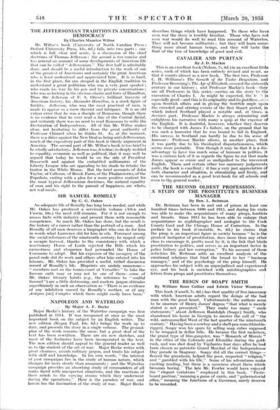SIR SAMUEL ROMILLY
By C. G. Oakes
An adequate life of Romilly has long been needed, and While Mr. Oakes has produced a serviceable volume (Allen- and Unwin, 18s.) the need still remains. For it is not enough -to amass facts with industry and present them with reasonable competence. So much Mr. Oakes has done, but the result is the history of a career rather than the portrait of a man. And Romilly of all men deserves a biographer who can doforhim in words what Lawrence did for him in oils. Foremost among the social reformers of the nineteenth century, he reaped_ only a meagre harvest, thanks to the consistency with which a reactionary House of Lords rejected the Bills which his earnestness and eloquence had persimded the House of Commons to adopt. But his exposure of the 'savagery of the penal code did its work and others after him entered into his labours. Mr. Oakes has provided a useful, rather discursive record of Romilly's life. Misprints are unduly numerous- " members met on the tennis-court at Versailles " to take the famous oath may or may not be one of them—some of Mr. Oakes' literary habits (e.g., the reference to soulful Samuel ") are a little distressing, and modern jargon obtrudes superfluously in such an observation as " There is no evidence of any inhibition caused by Romilly's mother, or of any Aedipus .Complex which there might easily have been."


































































 Previous page
Previous page